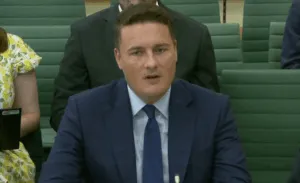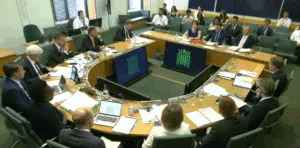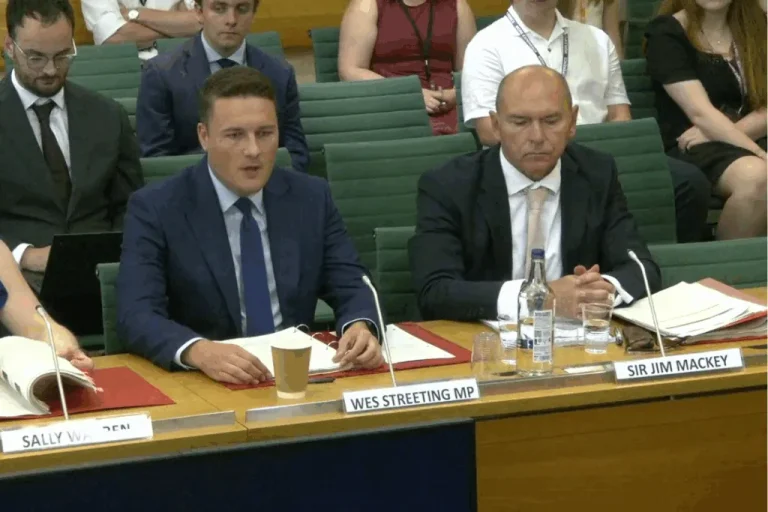Health and social care secretary Wes Streeting has told MPs he is “anxious” about the state of nurse pay progression and that he hopes to avoid a return to strike action, in the wake of the government’s new plan.
Mr Streeting today appeared before the Commons’ Health and Social Care Committee, to answer questions about the implementation of the 10 Year Health Plan, which was published earlier this month.
He appeared alongside NHS England chief executive Sir Jim Mackey and Sally Warren, director general for the 10 Year Health Plan at the Department of Health and Social Care.
“How we do the change is as important as what the change is”
Wes Streeting
Former district nurse Paulette Hamilton, Labour MP for Birmingham Erdington, chaired today’s select committee meeting.
Mr Streeting opened the evidence session by stating that the reception to the 10-year plan had been “extremely positive”.
But he acknowledged that many policymakers, NHS workers and members of the general public wanted to know more about how it would be delivered.
“People are extremely anxious about the NHS and its future,” he said. “They feel that sense of jeopardy, and there isn’t a single person using the NHS, or working in the NHS, who would say the National Health Service as it is today needs to stay exactly the same and exactly where it is.

Wes Streeting
“Everyone can see the scale of the challenge, and people want to see the NHS fulfilling its founding promise, which is to be there for everyone when they need it, and to do so in a way that defends the equitable principles at the founding of the NHS; the principle that healthcare should be based on need and not the ability to pay.”
Ms Hamilton pressed the health secretary on how the plan would succeed where other long-term visions for the health service had often fallen short.
Mr Streeting said that, while the three shifts central to the plan – hospital to community, analogue to digital, and sickness to prevention – were not “radical new ideas”, the way he wanted to fulfill them was.
“How we do the change is as important as what the change is…,” stated Mr Streeting.

Paulette Hamilton
“Thinking about some of the things contained in the plan – whether they’re new models of service delivery, new commissioning arrangements, new innovation in terms of medical science and technology – we will only succeed in delivering this plan if we’re doing change with people, rather than to them.
“That’s why, in terms of how we’ve approached some of the challenges as a government so far, and how we will deliver this plan, we will make sure that the implementation is designed with as well as delivered with people throughout the system.”
He claimed that, already, some system leaders had been “banging down the door” asking to be test beds for some of the changes the plan outlined.
Similarly, Conservative MP Joe Robertson – who represents Isle of Wight East – asked Mr Streeting what, materially, the difference will be between his proposed neighbourhood health centres and previous initiatives like polyclinics, diagnostic centres and Darzi centres.
Mr Streeting said that some of these schemes were “effectively strangled at birth”, and so were never long-term implemented, but that also the new centres would provide other services which their predecessors did not, such as minor injuries, urgent treatment and blood tests.
Asked how this would all be paid for, Mr Streeting said capital funding had been secured for the creation of more than 50 neighbourhood centres before the end of the parliament, with more if private partnerships could be secured.
Mr Streeting was then asked about palliative care. Ms Lewis, who has previously spoken to Nursing Times about her concerns about the funding challenges of hospices in England, asked how the government hoped to address these issues, given how little palliative care was mentioned in the plan.
“I feel very strongly… the principle we want to see in palliative care is the same as the rest of the NHS, which is giving people real choice over the care they receive, when they receive it and where they receive it,” he said.
Mr Streeting pointed to a cash injection the government had given to palliative care, though Ms Lewis said much of this had already been spent and that more was needed.
The committee also pressed Mr Streeting, as well as Mr Mackey and Ms Warren, about how they are supporting the NHS workforce, in particular resident doctors – who are due to strike later this year over pay – and nurses – who are threatening to do the same.
Mr Streeting said the scheduled wave of strikes by the British Medical Association’s (BMA) Resident Doctors Committee were “unreasonable” and “unnecessary”.
Farnham and Bordon’s Conservative MP Gregory Stafford asked the health secretary about remarks he had made in 2023 about an “unfair” gap between pay rises for nurses and doctors, and asked if a nurse strike would also, in his view, be unreasonable.
“Well, I hope that we’re not going to get to that position with nurses,” the health secretary said.

“Not least because we do have a reasonable dialogue and relationship with the Royal College of Nursing (RCN), Unison and other [unions].”
Andrew George, Liberal Democrat MP for St Ives, asked the health secretary about pay progression among Agenda for Change staff in general.
He pointed to the high number of nurses who started and ended their careers at band 5, and asked the health secretary if, under the 10-year plan, anything would be done about this.
Mr George said: “Very often you’ll have people who go into nursing, who commit their whole careers to it, and finish on band 5…
“Do you think that is sufficient? The majority of them end up in that situation. In chapter seven [of the 10-year plan], you talk about recruitment… but it’s retaining nurses that is the big problem.
“They’re leaving in their droves”.
In response, Mr Streeting said he was “anxious” about the poor progression among the nursing workforce and said the profession had not “received the level of respect and support to which they are entitled”.
He added: “Unless we give nurses better job security, better job satisfaction, and unless they feel genuinely recognised and rewarded for the work they’re doing, we end up in the worst of all worlds of investing a lot in their training and then losing all of that knowledge and experience when they go elsewhere.”
Mr Streeting did not outline specifically how he wanted to address the issue raised by Mr George, but reiterated a commitment to the NHS staffing unions to “reform” the structure of Agenda for Change.
“The future of the profession is bright, but as with most things in this job, going back to July 2024, not necessarily where I wanted to start from,” he said.
The committee pressed him on various other matters raised in the 10-year plan, including childhood vaccination rates, NHS trust restructures, the public health workforce, and maternal health inequalities.
Towards the end of the session, Labour MP for Chelsea and Fulham Ben Coleman asked Mr Mackey and Mr Streeting for a single timetable for implementation of the 10 Year Health Plan.
The health secretary said it would be possible to do this for some of the more immediate pledges, but that longer-term goals in the plan would not have a set date.
Mr Mackey added that he would be instructing NHS organisations, in the autumn, to produce “medium-term plans”.
Read more on the 10-year plan

